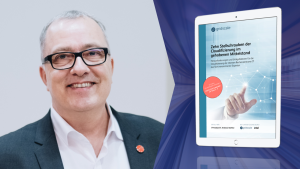“Every IT operation needs to move towards service delivery, whether through in-house operations or third-party provision of IT resources,” says Andreas Weiss, Director at EuroCloud Deutschland. Together with other experts, Weiss contributed his know-how to a German study by gridscale and Intel on cloudification for high-end SMEs.
Digitalising processes, working remotely and becoming more virtually resilient – companies in Germany have had to engage in a rethink. The Covid-19 pandemic has driven digitalisation forward. Many company leaders have realised that “in an increasingly uncertain and rapidly changing business environment, IT needs to be particularly flexible and adaptable,” says Dr Dr. Andreas Stiehler. In summer 2021, the IT analyst authored an expert study on behalf of gridscale and Intel that determines the challenges and success factors for the cloudification of internal data centre IT in the high-end SMEs. Companies from this group in particular often still give the cloud a wide berth. This is the view of the analysts, IT consultants, cloud specialists, providers and association representatives that contributed to the study.
Short-term provisional solutions curb longer-term sustainability
Modernising systems and harmonising them via the cloud – these are goals that still cannot be realised overnight. Existing IT landscapes in SMEs have grown and are deeply integrated into the core business. “As a result, many players today tend to implement what they see as cost-effective cloud transition solutions,” the study notes. What seems sensible and understandable in the short term, however, produces considerable additional expense in the long term. Take containers, for example: “Interim solutions (such as containerisation) seem sensible and attractive in the short term, but they are not sustainable,” says expert Weiss: “Simply packing existing systems into virtual containers without the cloud management functions and without linking them to other business applications is not expedient.” Those who are not familiar with cloud native technology quickly make mistakes.
How agile methods can collide with classic IT operations
When it comes to building cloud environments and developing them for the long term, the IT analyst states that: “There are multiple methods and approaches that help towards supporting and promoting cloud-based IT operations.” However, he goes on to observe that their implementation rarely runs smoothly. Regardless of whether it’s frameworks, agile methods or DevOps – if these come up against classically organised IT operations, problems are inevitable. According to the study, cloudification requires a cultural transformation to take place in advance, with this transformation to be based on a new self-image of internal IT. To take personnel strategy as an example: companies must question themselves and find out whether they are in the position to cultivate the required know-how within their own ranks. Subsequently, cloud use and external providers go hand in hand in SMEs. Stiehler: “Those responsible are thus faced with the task of also redesigning the cooperation with the service providers.”
Public cloud services without equivalent alternatives
Another German-language SME study conducted by gridscale and techconsult in spring 2021 shows that 34 percent of German businesses want to move more workloads to the public cloud in the future. And not without reason: “There are no equivalent alternatives for public cloud services,” the cloudification study points out. However, users have to weigh things up. It is true that public cloud solutions are superior to the private cloud in terms of performance, scaling and innovation. But as soon as users have set up their applications and processes via the options provided by public infrastructures and services, it is difficult to break away from the providers. “Dealing with public cloud offerings is regularly at the centre of discussions about suitable cloudification strategies,” writes Stiehler. However, the experts warn against relying exclusively on internal solutions.
Making IT systems and business models more flexible
One thing is certain: “Every IT operation must orient itself towards service provision, regardless of whether it is operated in-house or whether IT resources are provided by third parties,” says Weiss. There is no way around the cloud for high-end SMEs. Companies must strategically plan and tackle their cloudification. After all, transformation is not an end in itself, but a means to make IT systems and SME business models more flexible.
The complete German-language study can be ordered online free of charge.
Contributors to the expert study are:
- Karsten Leclerque, Head of Infrastructure & Cloud Services Practice at PAC, a teknowlogy Group company
- Axel Oppermann, Analyst at Avispador
- Marcus Neumann, VP Cloud Innovation & Operation, Materna
- Christoph Wolf, Head of Data Center & Cloud Solutions, Controlware
- Andreas Zilch, Principal & Innovation Advisor at LEXTA – Part of Accenture
- Markus Leberecht, Senior Cloud Solutions Architect, Intel
- Christoph Maier, CEO at Thomas-Krenn AG
- Andreas Weiss, Head of Digital Business Models at eco Association and Director at EuroCloud Deutschland




